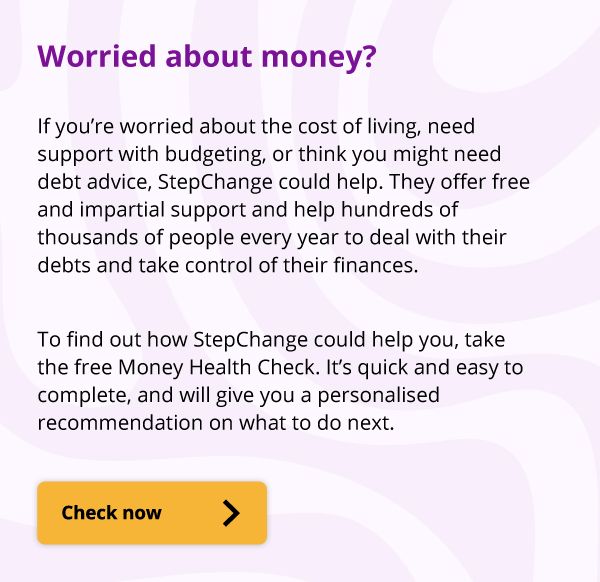
How does a debt spiral happen?
Please note that the example below is for illustrative purposes only.
- You have a disposable monthly income of £250, and no savings.
- Your fridge breaks, and you need to fund an urgent replacement. You don’t have the money to cover the cost upfront, so you apply for a personal loan.
- Your personal loan repayments – including interest – reduce your disposable income.
- A few months into repaying your personal loan, your car fails its MOT, and you need £400 to pay for repairs and get it back on the road as soon as possible. You don’t have £400 to spare, so you apply for another loan.
- You’re now repaying two loans with two different interest rates. Your disposable income dwindles further, and you struggle to afford necessities, such as groceries, so you apply for a credit card.
- You are now repaying three active debts: two loans and a credit card. You can only afford to make the minimum repayment amount on your credit card balance each month, so the interest mounts up, adding to your overall debt.
As shown in the example above, finding yourself in a debt spiral can happen all too quickly. The good news is that there are several things you can do.
How to get out of a debt spiral
1. Make a list of your debts
Hoping to break a debt spiral? The first thing you should do is make a list of all your credit accounts. This should include loans, credit cards, and any other type of debt you have, such as buy now pay later.
It’s natural to feel alarmed when faced with a list of your debts, but please remember that acknowledging the situation is the first step towards regaining control.
2. Reevaluate your finances
Now that you’ve got a clear idea of how much money you owe, it’s time to look at the bigger picture. Set some time aside to go through your finances in careful detail.
Work out your guaranteed monthly income, then deduct your essential outgoings, such as credit commitments, housing costs, bills, and food.
The money you’re left with after you’ve deducted your necessities is your disposable income. This can be saved or spent however you choose, but if you’re working towards clearing your debts, you may want to use some or all of this money to make overpayments on your outstanding balances.
3. Start or build up a savings pot
We understand that it’s not always possible to save money, but if you do have some disposable income to spare, adding to a new or existing savings pot could be something to think about.
Even saving £5 a month will help you build a financial safety net over time, which could prevent you from having to apply for credit again in the future.
4. Remember the golden rule of credit
If you’re struggling to repay your debts, it could be a good idea to take a step back from using credit cards.
You should never spend more money than you can afford to repay.
Before you buy anything, ask yourself the following questions:
- Can I afford it?
- Do I need it?
- Could I get it cheaper somewhere else?
- Could I borrow this item from a family member, friend, or community group, rather than buying it?
5. Look for ways to cut your costs
Whether it’s a supermarket swap or cancelling an unused gym membership, casting a closer eye over your monthly finances could present you with surprising ways to cut down your costs and increase your disposable income.
6. Be realistic – and don’t feel disheartened
It could take a matter of months to clear your debt, or it might take five years.
If you’re actively working to improve your financial situation, you shouldn’t feel disheartened.
Becoming debt-free will take time - but it’ll be worth it.
7. Decide on a plan that works for YOU
There are several ways to approach a debt spiral, and it’s worth doing thorough research into each method to find the one that best suits you. Everyone’s financial and debt situations are unique to them, and the debt-clearing method that works for one person might not necessarily work for another.
Some common methods of clearing debt include:
- The snowball method
Aim to repay your smallest debt first and work your way up to the biggest. Seeing your debts clear one by one will give you a motivational boost to keep going. - The avalanche method
The avalanche method works in reverse to the snowball method, in that you’ll repay the biggest debt first, or the debt with the highest interest rate, and work your way down to the smallest. While progress could be slower with this method, you may feel a huge sense of relief to see your biggest debt being cleared first.
8. Do some research into a debt consolidation loan
If you’re wondering how to stop a spiral and get your finances back on track, a debt consolidation loan could be something to research.
It’s important to understand the risks involved with a debt consolidation loan before you decide whether to search for one.
How does a debt consolidation loan work?
- Work out the overall amount of debt that you owe, including interest.
- Apply for a debt consolidation loan to cover the cost of your combined current debts. You must make sure that the interest rate on the debt consolidation loan is lower than the interest you’re currently paying. You should check if you’ll be charged an early repayment fee by your current lender(s) and take this into consideration.
- Use the debt consolidation loan to clear your existing debts.
- Repay your debt consolidation loan in monthly instalments. Rather than paying multiple debts and interest rates, you’ll now just repay one loan with one interest rate. Streamlining your debt could also make your repayments easier to keep on top of.
You can find out more about debt consolidation loans in our guide here.
Remember that help is available
We understand how scary it can be when you’re trying to get yourself out of a debt spiral. It can feel like you’re drowning, but please remember that you CAN find your way back to the shore and regain your financial freedom.
Breaking a debt spiral can take time and patience, but it’s a journey worth starting.
If you need a little help, or you’d like to talk through your concerns with an impartial ear, you can reach out to StepChange, MoneyHelper, Citizens Advice, and National Debtline.

